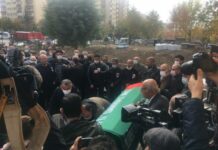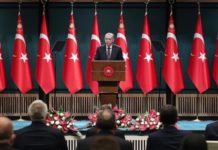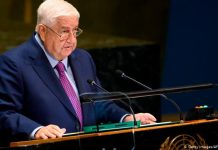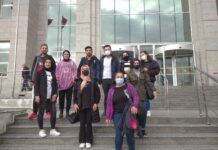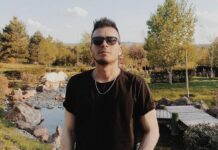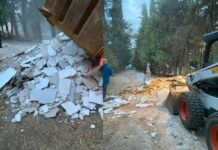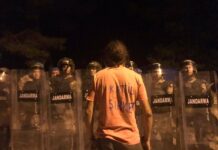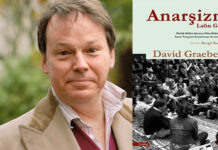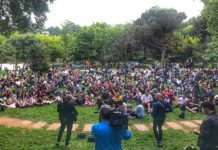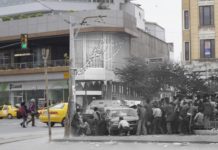Interview with Anarchist Geographer Simon Springer
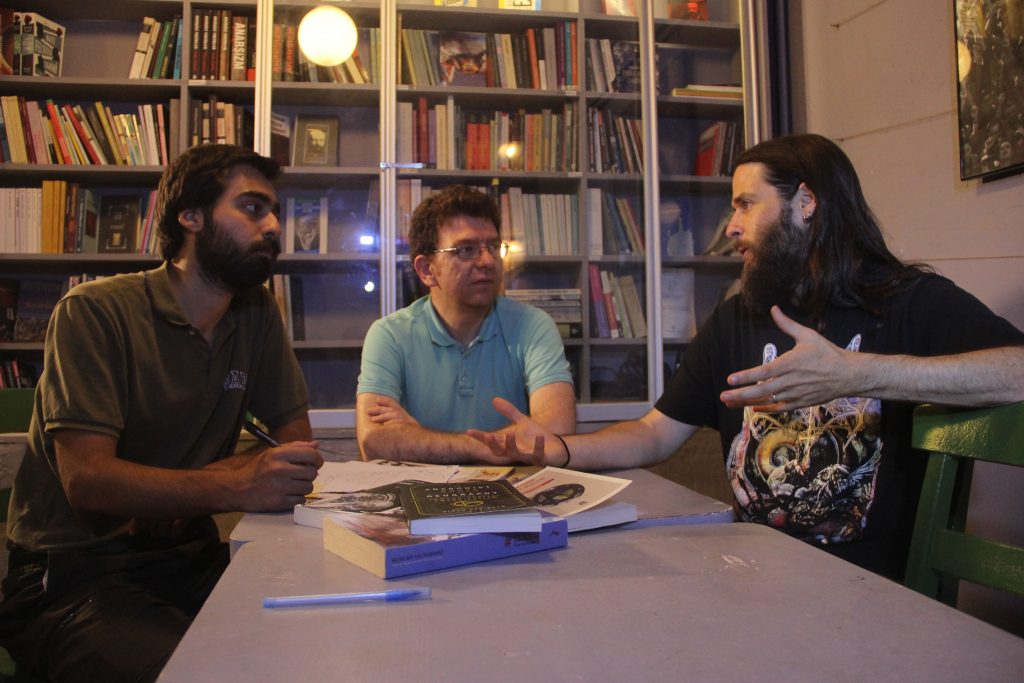
Meydan: Why must a radical geography be anarchist? Why is important to talk about anarchism and geography with relation to each other?
It’s a response to a 1972 article by Steem Fook, who wrote a piece called “why a radical geography must be marxist?”, so I said, I must not be marxist. Radical geography had become an area of study that has become very much dominated by marxism and Harvey had profound influence on the trajectory of radical geography. My concern with that is the stagnation that’s involved when an entire field is dominated by one perspective. From the late 1960’s marxism was dominated by particularly white males in anglo-american geography and they were content to ignore feminists. There’s a lot of critique to be made not only of Harvey but other geographers and other marxists who have continued to hammer on this marxist message without ever having taking into consideration the feminist and anarchist critiques. If we have something called radical geography, how is that this distinct neglect of anarchism when we have this earlier tradition a hundred years ago, Kropotkin and Reclus were writing about anarchism from a geographical perspective. There was a colonial enterprise when Kropotkin and Reclus and a few others said this is terrible, we need to have an anti-colonial geography.
Does David Harvey still propose a central model of geography based on the state? What should be done to break the marxist hegemony on geography?
I think breaking the hegemony of marxism in geography is already happening. Young scholars are no longer inspired by marxism, even in the way 10 years ago they had. They recognize that the kind spatial politics that marxism is articulating, there is something interesting there in a historical sense, but it doesn’t resonate in the same way that an anarchist spatial politics does with what’s happening on the streets, in our neighbourhoods, all across the world. Anarchism has its finger on the pulse of what’s going on in our communities because anarchism is a spatial practice that arises from those communities. marxism on the other hand, has been, right from the outset, something that’s dwelled in the domain of theory without having the kind of grounded reality that an anarchist politics has. Within academia there is this enterprise of academics, creating their own little empire of knowledge and information, so there is this decided effort to push people to a marxist trajectory. If you look at the title of my phD dissertation, the compromise with my committee was to put post marxism in the title because they didn’t want me to have anarchism in the title of a phD dissertation.
I think in the last couple of years we’ve sort of blown the lid off that sort of caption marxism have had. Last year in Italy, I was involved in organizing a first annual anarchist geographers conference something like 75 people showed up. I think the reason for the interest comes then from that there is so much left unsaid within a marxist politics and the way that marxism and David Harvey in particular wanting to conceptualize space in the kinds of relations that come from their emphasis on a spatial politics that preferences the state.
I see the authoritarianism, I see the statism, I see the hidden vanguard within Harvey’s work. Harvey always wants to play himself off like he is this friend of anarchists. If you read Harvey closely he’s very antagonistic and has a deep sense of animosity for anarchists, anarchism in general, certainly anarchist ideas.
There is so many limitations in the statist authoritarian perspective that marxists want to continue to work with, and I think when we start to ask critical questions about where the violence is coming from, in this world, it draws us to capitalism, which marxists recognise, but in that equation of capitalism where is the state in all of that? And the state is always in the front and center. The state facilitates capitalism. You can’t have capitalism without a state and you can’t have a state without capitalism. The historical record proves this to us in the sense of the Khmer Rouge engaging foreign rice markets to prop up their supposedly egalitarian society, Emma Goldman had scathing critique of communist Russia and the way that it was engaging in capitalist enterprises, the same thing in China, and so each and every example of where supposedly we’ve seen the reigns of the state captured by folks who are wanting to turn it into another direction away from capitalism, capitalism continues to fold itself into the process of the state. The is the nature of hierarchical relations. They are exploitative through and through, and what better way to exploit than through the means of capitalism. I don’t think contemporary marxists have come to grips with this, or can come to grips with this. There is no accounting for it.
David Harvey says that anarchism is a slippery slope to neoliberalism because of the decentralised politics that anarchism wants to evoke. Of course this is nonsense. Because a decentralised capitalist project looks nothing like a decentralised anti-capitalist project. It’s a ludicrous assumption but it’s something that Harvey always wants to ploy.
I have read Rebel Cities when it came out and I was just pissed off because there was so many mischaracterizations of anarchism embedded in the kind of spatial politics he was wanting to evoke. The other thing is the question of scale. Harvey goes to scale repeatedly to say that an anarchist project is impossible and it’s just this very localized idea that just simply doesn’t work and when anarchists respond saying well look at Murray Bookchin’s municipal libertarianizm or think about the way that Kropotkin was articulating a federalist idea of anarchism, Harvey just says well if it looks like a state, and walks like a state and quacks like a state, it must be a state. He misrecognizes the kinds of horizontal organising that anarchists imagine, this reconfiguration of our political geographies in a horizontal sense, rather than a hierarchical sense as being the equivalent of the state. Let’s think for a minute what is a state. A state is about having a police force, it’s about having discernable laws that are enforced by police, it’s about having a military. Where are these components within a federalized version of anarchism in the sense that Kropotkin was talking about. They don’t exist, so Harvey’s wanting to actually make these mischaracterizations, I think very purposely.
Not just to blame Harvey, his ego is fed repeatedly by the wider academic community. Why is David Harvey unchallengeable? Marxists particularly get uptight about this because they buy so heavily into the idea of cult of personality. We see this around the figure of Marx himself, as though he was the only person who was writing and thinking about these kinds of ideas at the time he was writing. Here is we see that the parallels between author and authority, they have a similar root word, so what is an author? My name appears on my books, but am I the actual author of that, I’m the compiler of that information, but all of my ideas built off conversations with the communities that I engage in. And the same with David Harvey and the same with Marx.
If we start to remember that in our spatial practices as well in the kind of politics we want to evoke, than that changes the way we think about organising. If it’s not just about David Harvey or some other academic or a politician or an elected official telling us what to do, rather it’s about us thinking about these ideas for ourselves and working them out together, that evokes an entirely different geographical imagination than the one that marxists are wanting to push forward.
You use the concept of commons in your book. What is commons?
In some ways it’s a very straightforward and simple idea, it’s been made complex because the capitalistic world that we live in has lost this idea of what a commons actually is. At a base level, I’d boil it down to the commons being the actual geographical expression of mutual aid, the way Kropotkin articulated mutual aid as reciprocity and cooperation.
The thinking is constrained by the political imagination that is at least some of the literature, like Henri Lefebvre and Habermas, in the way that they articulated notions of public space and private space. Private space very overtly referring to the spaces of capital they claim, on the other side, we have public space where in an idealized form that it is a space for the people, by the people, of the people and there is no sort of intervention or authority that constrains that space. The reality of course is those space are frequently controlled by the state. If we have a political imagination that wants to see public space as only a state based domain, that that limits the possibilities of what we can do with space. Or we can broaden out further and reclaim public space to transform it into a communal space and articulate it in such a way that it comes closer to the vision of the commons that we like to see.
The other way that the commons has been confused is the entire notion of property and how that is so taken for granted. The question of property is something that I wrestle with very explicitly in my work in Cambodia, That wrestling is a reflection on the lived experiences of everyday rural Cambodians who have a very different geographical understanding of property. Their notion is based upon actual use rather than a legal certificate of a piece of paper that says you own the land. So they understand it in a sense that Pierre Joseph Proudhon wanted to articulate a distinction between property and possession. Everyday Cambodians understand land holding as a possession. What is property in contrast? And this is the way that Proudhon was wanting to frame it in his most well known “What is Property?” In which he answered, property is theft. Proudhon said property is rooted in the idea of sovereign right, which is then bestowed upon a proprietor where it becomes, his right to use and abuse that property as he wishes. Property becomes fundamentally a means for exploitation which stands in stark contrast with possession. And property of course vested in sovereign right, in the past meant the divinity of kings, but in the present moment it means the sovereign state and the legal authority that comes with it becomes a means for unleashing the violence of the state. There are soldiers who shoot and have even killed Cambodian villagers for not walking off the land when they told to do so. Property isn’t just theft as Proudhon was trying to articulate, it’s also violence, very explicitly. It is a means of domination, a means of violence. It’s something that’s lost in present understanding which relates to the commons, in the sense that the world is increasingly constrained in this view spatial politics that is rooted only in property as though that’s the only way to conceive of land holding and only way of how we define and articulate various spaces, that it has to be proprietary relations. And there is huge enterprise behind this. We have the IMF and the World Bank, who are more than willing to enact Cadastro regimes upon any country they’ve got their hooks into to enforce a property system because of course it’s been the bedrock of capitalism.
A commons thinks in the landholding in the same way as Cambodian villagers do, instead of being a individual possession, it’s a communal possession. It’s based on the actual use of a community and so, when we start to think of public space as a commons, we’re going to see significant resistance from the forces of property, the forces that are trying to continually prop up the notion of property, very explicitly the state. Once again, we see how the state and capitalism come into concert with each other. The state is thoroughly woven into capitalism, it’s impossible to untangle that.
In the context of neighbourhoods, we see efforts to actually create a commons. We have this huge narrative about capitalism and about the state and the way they condition us in particular ways, and of course they do, but we also have agency, both at the individual level, but also at community level. Very simple things like organising a childcare co-op instead of one mom or dad soldiering by themselves all alone with their children and putting their children in paid childcare, what happens when you organise a group of mom and dads together. Then you start to think, what kind of space would we need to actually make this work? If we start to live closer together and we start to live in a more collective kind of way. So all of these ways of rethinking the commons, there is a distinct spatial politics that’s embedded within them, but therein is the challenge because the world is constructed for us to think in terms of property relations and to think of ourselves as lone individuals against the world. What makes life beautiful is these kind of connections that we have for each other, so it’s about reimaging how we bring ourselves together and trying to reconfigure our spaces in ways that work towards a sense of value that includes the commons.
You talked about Reclus and Kropotkin at the start of Radical geography and went back and studied them. Who else in the course of geography can we read who are thinking in parallel with anarchism? And that are sources for Anarchist Geography?
AAG, the largest geographical organisation in the world, 10,000 people show up and we make sure that we have a few anarchist geography sessions in yearly conference. The IDU, we organised sessions on Kropotkin in Moscow and Bolivia last year.
In 2016, there was a trilogy on Anarchist Geographies, you’ve covered it in newspaper before. What are the kind of ways which anarchism is resonating with the empirical work that you’re doing, and so one of them was focused on pedagogy, one on theory, and one on more empirical forms of resistance.
Currently I am collectively working with others on four volumes on Anarchist Political Ecology, so another sort of trajectory for anarchist geography is an anarchism more generally to go and to explore what are the ecological implications of the arguments that we’re making.
We put the call for papers out and the response is overwhelming. This is the beauty is that there is so much interest in this, rather than having a cut throat approach to academia where we choose only the “best papers”, we work with all of the ones we received and as inclusive as possible, and really start to try to create the networks, foundation for anarchist geographies to blossom even further.
Also getting involved in some of the Anarchist Studies Conferences, North American Anarchist Studies Network, they have a conference every year, this year it was in Quebec and also the Anarchist Studies Network in UK, I know many geographers go to those conferences as well. Just trying to build the foundation of this being something that is no longer taboo and that increases awareness and wants to draw more people into it rather than being my thing or your thing, this very specialized nhieshe, let’s try and expand this as far as possible, is the overarching objective.
I think there is a lot of people who are doing work that is in the vein of anarchism, but they won’t necessarily define themselves as an anarchist. Dorian Massey’s book For Space (2005) shows geography is a process, a living breathing thing that continues to evolve, we’re continually shaping it and reshaping it. The potentiality of space to be reshaped not just by state or capitalism but actually by ourselves, that there is no preconditioned destination that we are headed towards.
Audrey Kobayashi on the politics of race. Rhys Jones, doing work on borders, Federico Ferreri is a historical geographer, scouring the archives and finding letters that were written between Kropotkin and Reclus. Other anarchist geographers like Anthony Ince, Gerónimo Barrera doing work on anti-statist geographies. Richard J. White in everyday relations of mutual aid. Ophélie Veron, exploring anarcha-feminism.
Yesterday there was a question about Rojava Revolution. The geographies and processes like Rojava, like Chiapas are important for us. What can you say about these kind of experiences which is directly related with geography?
I’ve not had any connection with either of these particular communities, so it’s hard for me to articulate. There is decidedly spatial politics within the movements that have been created there, so I think that’s fantastic and inspiring to see, but it’s very difficult for me to say, ok this is what they should be doing, or they did this right, they did that wrong, and these sort of things. I don’t think it’s my place as an outsider to make those kinds of value judgements.
The way that I locate my politics is, even in the work I did in Cambodia, I’m an outsider in that context. I’ve been going to Cambodia for almost 20 years now and speak the local language which helps facilitate a bit of a deeper connection, and of course my daughter is adopted from Cambodia which makes a stronger personal relationship as well, but I’m not Cambodian, so I can’t speak for Cambodians and what the political vision they’re wanting to articulate is. My way that I approach is to want to work with those communities rather than to impose my views upon them and speaking with them like what is the message if I’m writing a paper on the work that I’m doing in the communities with the people I’m working with, what is the message you want to transmit back to the world? So I think it’s always important for that message to the extent possible to come from that people who are directly involved in the struggle, to have them voice their view and their opinion about the successes of their movement, the missteps of their movement, and the future possibilities of that movement.
In the same way, I am inspired by these movements, I think they’re critically important in the sense that they give, as an anarchist academic, they give us something very tangible to say, there are real world applications to what we’re thinking about. This isn’t just theory, there are ideas that being manifested in very particular ways. Look at how the work of Murray Bookchin has been taken up. The kinds of ideas that come out of that had been applied in a very particular sense, that part if it is interesting and inspiring.
This interview published in 46th issue of Meydan.



